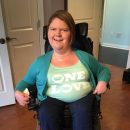- A
- A
- A

It was a special day. My son’s school was having a march and the parents were invited. The march was to finish at a monument where some of the students would perform. The trouble started when the entire school began walking out a door with steps. At that point, my son and I and another little boy in a wheelchair had to dash out the front door, down the ramp and try to catch up with our classmates. My son was concerned that he wasn’t near his friends, so we ran as fast as we could. We caught up with a couple of them, but most of the class was far ahead.
When we got to the monument, my son’s classmates filed down the stairs in the theater to the first couple of rows. My son and I scrambled for some wheelchair accessible spots in the very back. We were as far from his friends as possible in that small theater. During the entire performance, my son kept asking, “Where is my class?” I pointed out some of his friends, along with his teacher, but he couldn’t understand why he and his aide were so far away from everyone. Neither could I.
I was completely stunned by the situation, and for that reason I didn’t act in the moment. I regret it now. I wish that my internal Mama Bear had reared up and asked the staff to carry him down the stairs or even better asked the class to sit near him where he was or best yet asked in advance that they have the performance at an accessible theater. I didn’t do those things. Instead I fumed, until after he returned to school. At that point, I talked to my husband and we reached out to the school to talk to the principal and his teacher about what had happened and what could have been better.
They were very gracious at our meeting. They regretted what had happened and did not realize that my son felt separated. They promised to continue improving their inclusion efforts. I was happy with their response, but I still had this nagging worry. If this happened when I was there, what happens when I’m not.
I believe that the people at his school genuinely care about inclusion and genuinely want to improve. The problem is that they may not see the same opportunities to improve. Most people’s eyes don’t work like mine, don’t see the small separations that make little nicks in a disabled child’s self-worth. But trust me, my son will.
And what about the people outside of school? Will the people at day camp or at a friend’s birthday party notice when my son is left out?
These fears are not theoretical. I had the same things happen as a child. The picture of my National Honor Society induction shows me 15 feet away from everyone else on the bleachers. Our senior picnic was planned at a place with several buildings upstairs. When I did children’s theater at the age of five, I was asked to give the play’s introduction instead of playing a sprite like my sister. I also see the same stories in the news. Children in wheelchairs sitting separate in class pictures or singing several feet away from the rest of the choir. These may seem like heartbreaking isolated incidents, but when you talk to disabled people everywhere there’s a common theme. We were separated from our peers at some point or another.
When it comes to disability, some individuals and organizations still try to push separate but equal. But that’s a myth. Separate is never equal. In the age of Olmstead, hopefully people are starting to recognize this.
I wish there was a near term solution. I wish everyone would start looking through my eyes. Sometimes I wish I could follow my son everywhere–to make sure that he isn’t forgotten, to make sure he isn’t on the back of the bus when all of his friends are at the front, to make sure he isn’t steered into particular classes or extracurriculars because of his wheelchair. But these are wishes, not expectations.
Instead, I will work to educate people so that more and more of them can spot these injustices. I will teach my son to spot them for himself and speak up. And sometimes I will bring out Mama Bear to make things right and to add a little class to our world.
Katrina Gossett Kelly wears several hats. She is an attorney at Faegre Baker Daniels in Indianapolis, specializing in trade secret litigation and e-discovery. She also performs improv at ComedySportz Indianapolis and serves as a disability advocate throughout Indiana. Her favorite job of all, however, is being mom to her young son, adopted last year from Bulgaria—an adorable little boy with the same disability as Katrina, spinal muscular atrophy.
Published on March 29, 2019